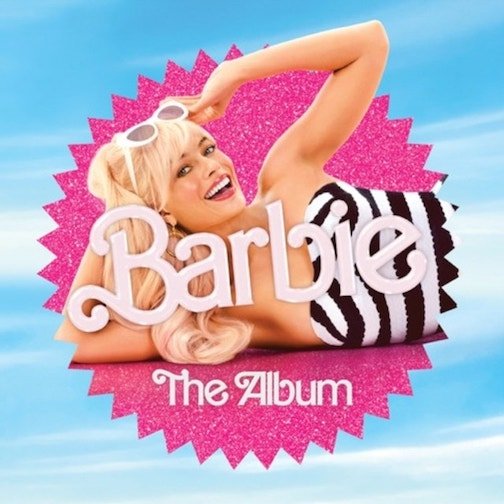Sugar and SpicE: barbie the albuM
By: Enya Xiang
Barbie The Album is all things sugar and spice, a glittery tribute to the girls of 2010s electropop. Produced by Mark Ronson, the album features a clique of our favourite pop divas in this soundtrack for the Barbie movie, directed by Greta Gerwig. The tracks follow Barbie’s (played by Margot Robbie) adventure as she and Ken (Ryan Gosling) leave their idyllic, pink Barbieland for the Real World.
As Barbie explores her image, facing a crisis between her perfect exterior and complex inner self, the album is similarly nuanced. The tracks in Barbie The Album are not supposed to be original, but that’s what makes them genuinely fun.
The album returns us to the sweet auto-tuned sounds of girlhood summers and peppy anthems of female empowerment from Britney Spears, to Katy Perry, to Doja Cat. These songs’ contents are artificial and plastic—like Barbie—but they create authentic joy for women who seek it. Understanding this sense of nostalgia, Barbie draws on its ditzy soundtrack for world-building, then lets the script shoulder its more hard-hitting themes about femininity and power.
In the film, Barbie’s world turns upside down when her shower turns cold, her pointed feet become flat, and she starts experiencing thoughts of death. She decides to visit the Real World and find the human whose behaviour is disrupting her life in Barbieland. Before the plot unfolds, the soundtrack contextualises Barbie’s perfect universe.
As the first track ‘Pink’ by Lizzo plays, Barbie wakes up in the dollhouse, begins her perfect morning routine, and glides into her pink convertible. Setting the scene for Barbieland’s girl power matriarchy, Lizzo’s warm, melodic voice, with some musical theatre flair, asks, “What you wearin’? Dress or suit? / Either way, that power looks so good on you”.
Thanks to the star-studded soundtrack, as viewers and listeners we understand the vital bond between doll and human. As Barbie leads a glitzy dance sequence in her Dreamhouse, Dua Lipa’s glamourous, disco-themed ‘Dance The Night’ hints at her internal conflict: “Even when the tears are flowing, they're diamonds on my face”. ‘Barbie World’ by Nicki Minaj and Ice Spice samples Aqua’s 1997 hit ‘Barbie Girl’, upgraded with raunchy lyrics. Ice Spice declares, “She a Barbie bitch with her Barbie clique / I keep dragging her, so she bald a bit”, referencing the ways children have disfigured Barbies and made them their own.
The purely bubblegum pop ‘Speed Drive’ by Charli XCX takes the hook of Toni Basil’s 1981 ‘Hey Mickey’ and ramps it up: “Jump into the driver’s seat and put it into speed drive”. Charli XCX then slows down to promise, “The girls who need to know, well they already know”. The female utopia of Barbieland, just like the Barbie movie, caters to the girls.
Featuring Tame Impala’s Kevin Parker, ‘Journey To The Real World’ is a comedown from this hyper-feminine hysteria with a dreamy return to space disco, a futuristic sub-genre inspired by Star Wars in the late 70s. As Barbie drives away on a pink brick road, Parker wonders, “I wonder what we’ll see when we get to the real world”.
Despite the soundtrack full of well known hit-makers, the true star of Barbie The Album is Ken, or Ryan Gosling, in ‘I’m Just Ken’. It’s a ridiculously divine 80s ballad, complete with electric guitar and melodrama. Against a sentimental piano, Gosling sighs with plenty of self-pity, “Is it my destiny to live and die a life of blonde fragility?” A frenzied guitar riffs into building drums in true 80s rock style, making way to this loaded confession: “Am I not hot when I’m in my feelings?” An instrumental break, not unlike the meme-ified opening of a-ha’s ‘Take on Me’, provides a backdrop to Ken’s crisis of masculinity.
As Barbie shifts to its falling action, Barbie’s understanding of the human experience reaches a turning point during Billie Eilish’s ‘What Was I Made For?’ Eilish’s voice is sedating and stinging over a bare piano, exploring feelings of despair: “I used to float, now I just fall down”. She ends half-hopefully, “I don’t know how to feel / But someday I might”, as Barbie finally makes sense of her identity on screen.
What ‘the girls’ like is pink, plastic, and fun. Barbie The Album creates a musical reality where girliness has a place to be adored as well as confronted. Pop music may not be a shining example of lyrical genius or brilliant composition, but sometimes it doesn’t have to be. Like its movie, the soundtrack is an unadulterated delight in the hyper-feminine, a dainty pink compact mirror reflecting the larger female experience.

